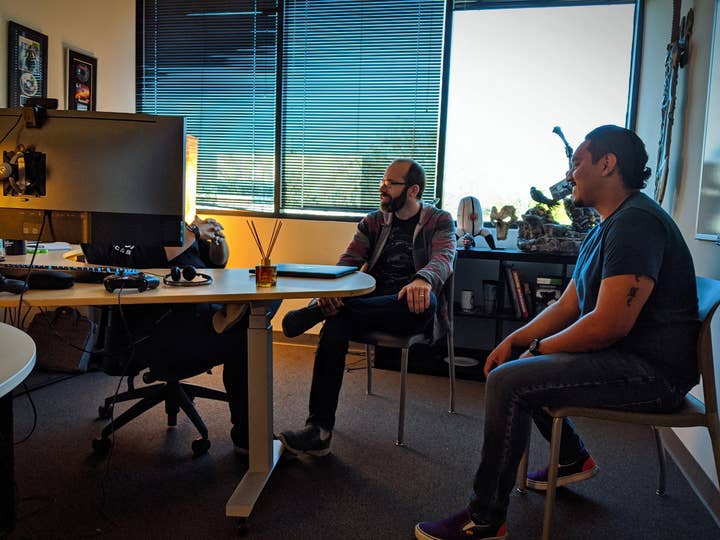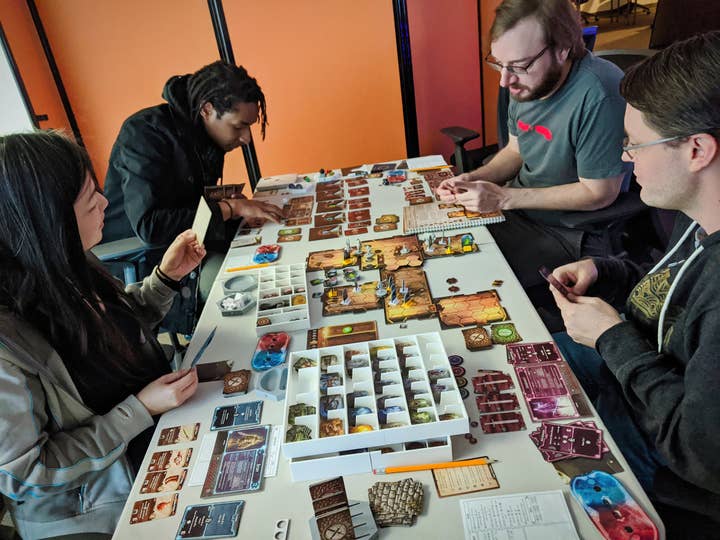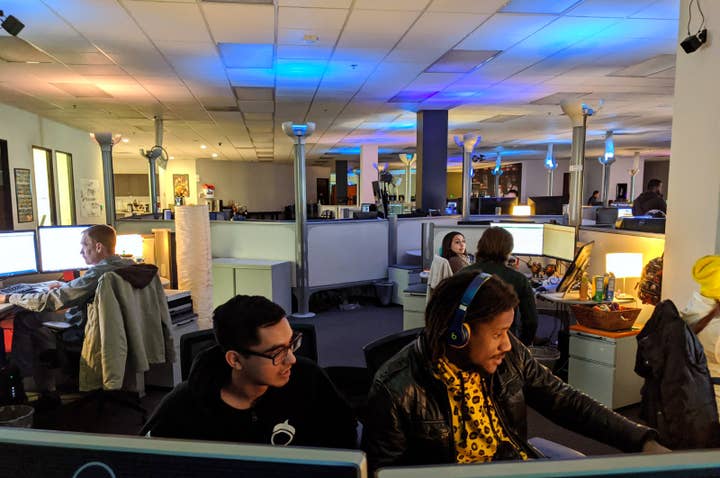Blind Squirrel Games' decade-long drift from work-for-hire to original IP
CEO Brad Hendricks on what it took for the company to grow beyond its engineering focus and make its own IP
Of the manifold ways that game studios celebrate their big milestone anniversaries, Blind Squirrel Games has gone with a bit of an uncommon one: it's changing up its business strategy.
In the year of its tenth anniversary, Blind Squirrel Games is preparing to go from a studio doing solely work-for-hire projects to a studio with its own internally developed, self-published IP. This is a longstanding dream for CEO Brad Hendricks, though his plan for the studio at its founding was a fairly practical one.
"There were an insufficient number of work-for-hire studios supporting large projects, AAA projects, things like that," he says, speaking to GamesIndustry.biz about a niche he noticed while working his former job with IGN on the technology side of GameSpy. "And I saw an opportunity there."
"Work-for-hires are really cool. They enable a lot of new developers to get their feet wet and get a name and a reputation for themselves"
At first, Blind Squirrel Games consisted of only four people, including Hendricks, and was focused entirely on engineering. But over ten years, the studio has grown to (at times) 120 employees, and is currently right around 100. That meant diversifying the kinds of work the company took on, which ultimately led to bigger projects -- Blind Squirrel Games has worked on Xcom 2, Prey, The Sims 4, and Borderlands 2, among others.
But work-for-hire alone was never the end goal for Hendricks.
"Work-for-hires are really cool," he says. "They enable a lot of new developers to get their feet wet and get a name and a reputation for themselves. But ultimately, that wasn't where I felt that we should be heading as a studio. We've been trying for a long time to become an IP generator -- a studio that made really great games. And it wasn't really until a couple years ago, after we established a solid reputation for ourselves, that we now are fast forwarding into the IP development phase as well as self-publishing."

The turning point for Blind Squirrel Games was, Hendricks says, when they worked on Bioshock with 2K Games. At that point, the studio was at 87 people spread across engineering, design, production, and QA -- no longer just a "team augmentation." Hendricks describes it as "turning a corner," with the studio now able to take on full projects from start to finish rather than simply aiding on one particular aspect or another. And if the studio could finish a full project for another studio, why couldn't it then also make its own games, beginning to end?
Ten years in, Blind Squirrel Games is preparing to do exactly that, with free-to-play hero shooter Drifters: Loot the Galaxy. But that doesn't mean the company's planning to leave work-for-hire behind. Another milestone it hopes to reach this year is the opening of a second office in Austin, Texas (its headquarters is in Santa Ana, California) and establish a team of 30 to 40 people there by the end of the year. The Austin studio will continue to support the company's work-for-hire endeavors, enabling it to take on bigger future projects even as it continues to develop its own IP.
"Work-for hire provides a level of stability. But as you know, in the games industry, that's all relative, right?"
Often when speaking to work-for-hire studios, I hear them talk about the stability inherently provided by not taking risks on creating your own IP. But although I ask Hendricks about the potential risk of a new IP against the safety of the studio's existing model, he's not so sure Blind Squirrel Games is necessarily more stable than any other games company out there just because of the kind of work it does.
"Work-for hire provides a level of stability," he says. "But as you know, in the games industry, that's all relative, right? At the end of 2018, we had three simultaneous projects cancel for convenience, or for whatever reason. Each project was 20 to 30 people, and suddenly we're in a situation where we had a lot of people that we couldn't find homes for, and the timing was horrible, because it was in October.
"We had to downsize. We went from 130 people down to about 48 in about six months. We tried to find jobs; couldn't do it. But luckily, we managed to find work right in the beginning of 2019, and now we're well over 100 [employees]. So that's been ten months of rapid growth. It's feast or famine."
Hendricks is admittedly breezy about the ups and downs of the industry, having been in it for long enough to know that sometimes things are out of his control. However, he acknowledges that the studio's recent rollercoaster had given Blind Squirrel Games cause to buckle in to ensure that, if a similar situation happens again, it's a bit more prepared.

"Legally, we learned that we need to make sure we put protections in place in contracts for these types of events to occur so that we do have some cushions, because termination for convenience is a common legal thing in every contract I've ever seen," he says. "So what we've done is we've made sure that there are certain precautions that we take.
"From an HR and a personnel perspective, and an internal perspective, what we've decided as a company is that we want to make protection of our people priority number one. So we started maintaining what we consider to be a core group of people -- about 120 to 130 people -- and we'll scope that appropriately so we don't over-expand too quickly. We'll outsource where necessary and do things like that so that we can maintain the core people regardless of cancellation.
"Work-for-hire is a wonderful business and it keeps the light on. Own-IP expands on that revenue opportunity and brings in additional revenue sources"
"We're going to take on more stable projects, and we've created what I would call a working template internally -- sort of a strict strategic plan, that really solidifies the way that we want to work as a company."
In a way, creating original IP fits neatly into Blind Squirrel's strategic plan, affording tighter control over its own destiny. According to Hendricks, having an original, internally-developed game on a studio's resume opens doors that would be closed if it remained solely work-for-hire -- doors that can benefit both kinds of projects long-term.
"There are business reasons, and there are passion reasons [to develop our own IP]," he says. "From a business perspective, work-for-hire is a wonderful business and it keeps the light on, and it has solid margins. Own-IP expands on that revenue opportunity and allows us to bring in additional revenue sources.
"On the passionate side, I've always wanted...to create IP, because I wanted to be that full turnkey developer, and that has long, long term business opportunities for us. Because work-for-hire is wonderful, but we go into these publisher meetings and they say, 'We want a team to take on this entire part of the environment,' and they would ask us, 'What projects have you shipped that you've done on your own?'
"In the past, we just couldn't respond to that question. So I always had a passion to respond to that and say, 'Well, hey, we did this.' And now we're working on our own. So it's sort of a multi-faceted approach to how we want to grow as a studio."
For now, Hendricks is taking things one step at a time, with Drifters and the company's new studio expansion his current focus. However, if he has his way, Drifters won't be Blind Squirrel Games' only original IP. Hendricks suggests that he'd like to build more studios elsewhere in the US or even internationally, and put together the resources to become a studio that puts out its own games on a more consistent basis. Perhaps there may even be a Blind Squirrel Entertainment brand or something similar in the cards.
"We have a lot of other games in the hopper, so we've already started talking about a lot of other new opportunities in games that we want to create," he says. "We're hoping that Drifters gives us the opportunity to expand on that, and allows us to spin up our publishing model so that we can expand upon what Blind Squirrel Games is. We've aligned ourselves with some key investment community members that are willing to fund not only Drifters, but future opportunities for us. There's a bright future for us in the IP development world as well as the publishing world. So, stay tuned."

